Feature
Why Celebrating Bad Poetry Day May be Unfair
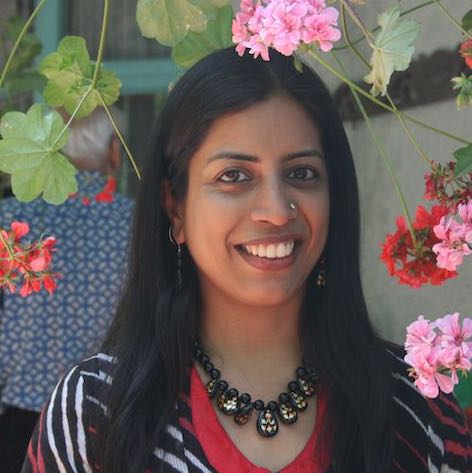
Neha Kirpal
August 17, 2018
“I am a part of all that I have met;
Yet all experience is an arch wherethro’
Gleams that untravell’d world whose margin fades
For ever and forever when I move.
Back in my school days, this poem—Ulysses by Alfred, Lord Tennyson—was my favourite. Published in 1842, Victorian poetry of this kind was common in those days. It had meaning, it had verse, it had feeling.
Cut to 2018, and poetry sounds very different today. Sample this verse by new-age poet Rupi Kaur from her book of poetry The Sun And Her Flowers:
“The orange trees refused to bloom
Unless we bloomed first
When we met
They wept tangerines
Can’t you tell
The earth has waited its whole life for this”
At first read, it’s not exactly deep. Or maybe it’s meant for today’s generation of readers to whom it speaks—it’s short and simple—much like our Tweets, texts or WhatsApp messages. In other words, it’s a formula for the masses—because that’s how you and I communicate with each other—and most people no longer (have the time to) read. Kaur is an internationally bestselling author. Her debut collection of poems Milk And Honey sold over 1.5 million copies worldwide and has been translated into over 23 languages. Clearly, something in her poetry (whether good or bad) worked in her favour. Then, who am I to judge her, or anyone else for that matter?
The fact is that in this day and age of the Internet and social media, just about anyone can be a poet. With the plethora of platforms, forums and avenues available, there is a space and a voice for all. These poets may not go onto win prestigious literary awards. But they will still be read, their voices heard, and who knows, they may even become very popular.
So, on the occasion of Bad Poetry Day, here’s the question I want to pose: Is there really such a thing as ‘bad poetry’? According to me, the question of whether good or bad is relative and largely subjective—but that’s just my point of view.
I decided to speak to some contemporary Indian poets about what they thought of the idea of dedicating a whole day to celebrating ‘bad poetry’, and here is what they had to say:
Aditi Rao:
(Rao’s poems have been published in national and international journals. She has won several writing awards such as the Srinivas Rayaprol Poetry Prize in 2011, the Toto Funds the Arts Creative Writing in English Award in 2013 and the Muse India-Satish Verma Young Writer Award in 2015).
“I like the idea of celebrating bad poetry. I like it because every poet writes bad poetry—it’s part of the process—but usually, we treat it like a dirty secret. I like the idea of celebrating the terrible poems we write before we can write decent ones.
I know I have a folder full of terrible poems, mostly held onto only because there’s a line or an image I like and hope to eventually salvage, but I would never send the poem out into the world. I would distrust any poet who said they don’t write any bad poems—just like I would distrust any chef who said they never cook a bad meal or any scientist who said they never have a bad idea. That’s just not how life works. As a teacher of writing, I know that it is often by allowing 20 terrible ideas that I can access three good ones—if I judged them before they made their way to paper, I’d cripple myself needlessly. So, I always tell students to give themselves permission to write badly—no one ever needs to read those pieces, plus most bad poetry can be edited into something better—and I know that some of my most heartfelt poems are the terrible ones. That’s okay, their job was catharsis. After that, I can move on to saying something fresher.”
Anjum Hasan:
(Hasan’s first book of poetry, Street On The Hill, was published in 2006. Her poetry has been published in various journals and anthologies).
“What concerns me is not so much bad poetry per se but the feeling that everything is subjective and there are no standards. We may as well forget about literature if we want to dispense with standards, taste, sensibility.
The fact that there are diverse traditions and styles of poetry does not mean that anything and everything can pass muster as poetry. To say it’s all subjective is a way of avoiding the work of reading widely and developing discernment. There is life beyond Bollywood lyricists and Instagram poets.”
(Aditi Rao via AditiRao.net)
(Anjum Hasan by Madhu Kapparath via AnjumHasan.com)
Keki N Daruwalla:
(Recipient of the Sahitya Akademi Award in 1984 and the Commonwealth Poetry Prize in 1987 for Asia, Daruwalla was also awarded the Padma Shri in 2014).
“Bad poets are good. Otherwise who the hell will appreciate decent poetry? The worse they are the better, except bad poetry should not drive out the good from the bookstores.”
Akhil Katyal:
(Katyal has published two poetry books How Many Countries Does the Indus Cross and Night Charge Extra).
“I don’t feel the need to deliberately distribute poetry into good and bad. I have written poems, which one person thinks are trash, as they remind me on Facebook comments, and another person takes it to their bedtime thoughts, as they kindly let me know over messages. Why mark some poems out as bad? If there were such a thing as a bad poem, then that poem would die a dignified death behind an un-clicked link.
A good poem will travel, not just in terms of numbers, but it will travel deeper into the recesses of your mind. You will find yourself going back to it again and again. And also, poetry usually, not always, but usually sets you to appreciate the world around you in a more receptive, sensitive way. It asks you to keep your aggression on the backburner—mostly, not always. By god, we need more of those. No matter if good or bad poetry gets you there. Also, usually people making these authoritative decisions about good and bad poems are always uptight, mostly Brahmanical, more often men sitting in their home offices/libraries with their Moleskine diaries and Macbooks who think only they or their mirror images write good poetry. I am fine without their meditations, thank you very much!”
I end with the lines of another favourite poem from my school days—Broken Song by Rabindranath Tagore—which I think aptly sums up my thoughts on this debate about bad poetry and Bad Poetry Day:
“The singer alone does not make a song, there has to be someone who hears:
One man opens his throat to sing, the other sings in his mind.
Only when waves fall on the shore do they make a harmonious sound;
Only when breezes shake the woods do we hear a rustling in the leaves.
Only from a marriage of two forces does music arise in the world.
Where there is no love, where listeners are dumb, there never can be song.”
What is your opinion on poetry? Should we celebrate Bad Poetry Day? Tell us about some ‘bad poetry’ you’ve read. Share with us in the comments below.


Neha Kirpal
Neha Kirpal is a freelance writer based in Delhi. She is the author of Wanderlust for the Soul, an e-book collection of short stories based on travel in different parts of the world. All her published work can be accessed on her blog.

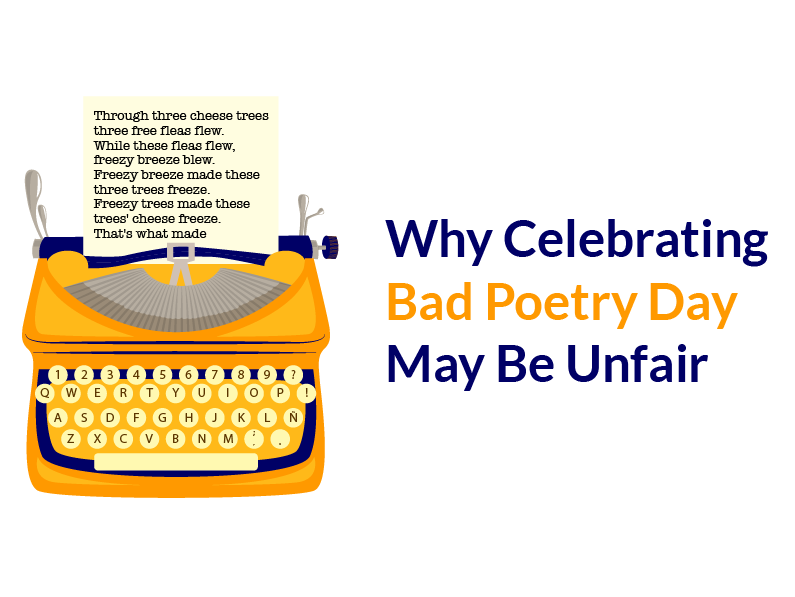
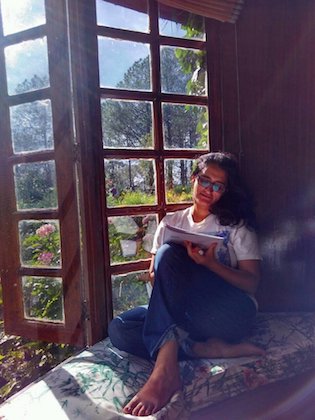
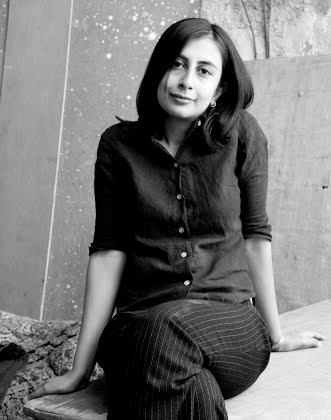
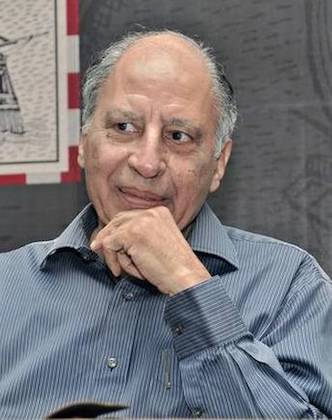
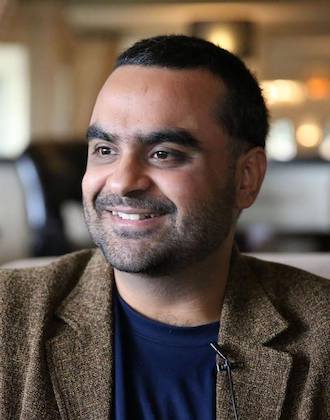

Check your inbox to confirm your subscription
We hate spam as much as you hate spoilers!